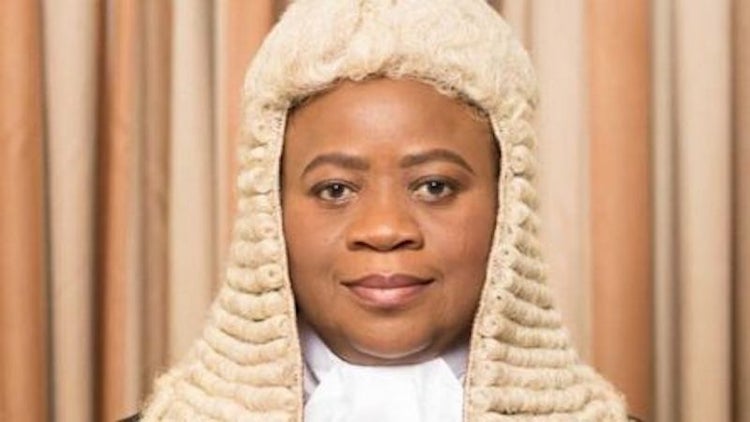2023: Release funds for Court of Appeal
The President of the Court of Appeal, Justice Monica Dongban-Mensem, has expressed concern that the non-release of funds by government could hamper the litigations that might arise from the 2023 general elections. Speaking last on this issue, Justice Dongban-Mensem said, “The essential ingredient for the tribunals to function effectively to maximum capacity is the provision […]

Justice Monica Dongban-Mensem
The President of the Court of Appeal, Justice Monica Dongban-Mensem, has expressed concern that the non-release of funds by government could hamper the litigations that might arise from the 2023 general elections. Speaking last on this issue, Justice Dongban-Mensem said, “The essential ingredient for the tribunals to function effectively to maximum capacity is the provision of the much-needed funding to provide adequate facilities for the tribunals across the nation. The funds to prosecute the 2023 general election petition tribunals have still not been released. This is becoming worrisome as it may impede plans to constitute the various tribunals and courts.”
It is well-known that the Court of Appeal has critical roles to play in both pre-election and post-election litigations. Section 285(12) of the 1999 Constitution of the Federal Republic of Nigeria (as amended), says categorically that: “An appeal from a decision of a court in a pre-election matter shall be heard and disposed of within 60 days from the date of filing the appeal.” In the same vein the constitution requires that the Court of Appeal hears and dispenses with post-election appeals within 60 days. Section 285 (6, 7, 8) says, “An election tribunal shall deliver its judgment in writing within 180 days from the date of the filing of the petition. An appeal from a decision of an election tribunal or Court of Appeal in an election matter shall be heard and disposed of within 60 days from the date of the delivery of judgment of the tribunal or Court of Appeal. The court, in all final appeals from election tribunal or court may adopt the practice of first giving its decision and reserving the reasons therefore to a later date.”
The law has cast in stone the limit for election petition hearing, as pre-election and post-election litigations not dispensed within 60 days would no longer have a force of law. Without funding, therefore, the constitutional mandate of the Court of Appeal could be impaired, and politicians could take advantage of the lack of funds to induce judges assigned to their cases. The 2023 general elections are very critical, and therefore should not be handled with levity. That is to say, three vital institutions must be provided with the funding needed to play their roles. First, is the electoral umpire, the Independent National Electoral Commission (INEC), the Nigeria Police Force and other emergency and/or safety agencies, and the Judiciary, where the Court of Appeal belongs.
It is very unfortunate that the Judiciary, which is supposed to access funds on First-Line-Charge, is raising the alarm about the non-release of funds for the election. It shows how unprepared the country is; though it had four years to prepare for the 2023 elections. Other organisations that support the country’s elections, mainly international partners, provide funding for the electoral activities and institutions they support as scheduled, a sign of proper planning. There is no doubt that funds for the Court of Appeal have been appropriated in the 2022 budget; the onus now rests on the Ministry of Finance to expedite action on the release of the appropriated funds. It is worthy of note that the non-release of funds for running the judiciary could lead to crisis, as seen in the confusion among justices of Supreme Court, which led to the resignation of Justice Tanko Mohammed as Chief Justice of Nigeria in June this year.
We call on the federal government to put in place measures to ensure funds are available for the Court of Appeal to carry out its roles in the 2023 elections. Apart from pre-election and post-election litigations, the court would need to train judges who would be deployed for election petition tribunals from one judicial jurisdiction to another. The court also has to produce election petition guidelines or manuals for all judicial officers in the 36 states. It must set up panels for governorship, House of Assembly, National Assembly election petitions in the 33 states where governorship elections shall take place and across the country for legislative elections. All these require a lot of funds, which must be released well on time for the various activities to be executed.
It is important to source the funds for diverse avenues, even if it requires taking it from the service wide fund. The 2023 elections are too important to be frustrated by the non-release of appropriated funds to all relevant agencies. All stakeholders must work towards the success of the coming elections.
